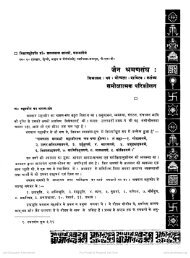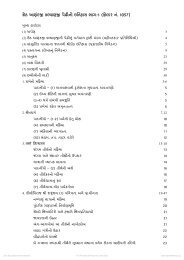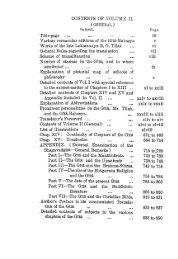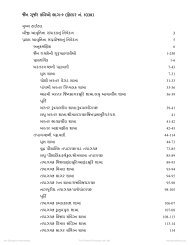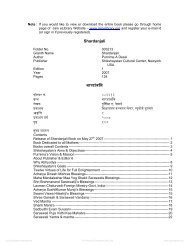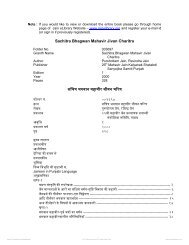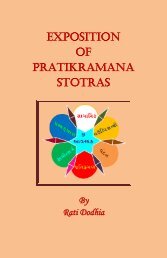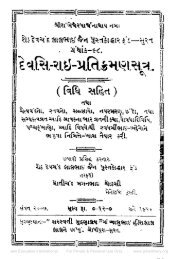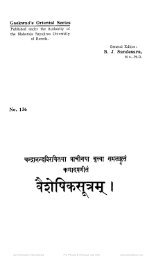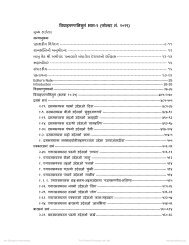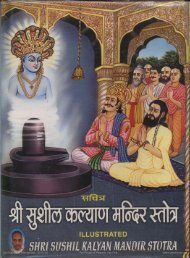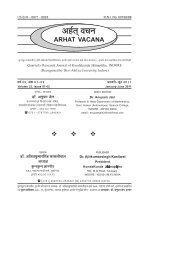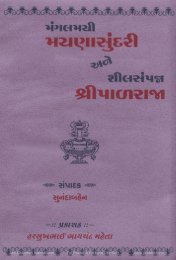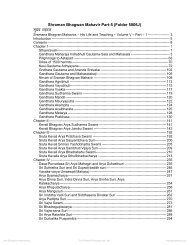Chapter - 08 Bon Po Religion - Jain Library
Chapter - 08 Bon Po Religion - Jain Library
Chapter - 08 Bon Po Religion - Jain Library
You also want an ePaper? Increase the reach of your titles
YUMPU automatically turns print PDFs into web optimized ePapers that Google loves.
Shri Ashtapad Maha Tirth - II<br />
Gilgit. The third <strong>Bon</strong> <strong>Po</strong> from Kashmir, a land famous for its Sanskrit learning among<br />
both Buddhists and Shaivites, was an expert in conducting the funeral ceremonies.<br />
Previously there had existed no philosophy of <strong>Bon</strong> in Tibet, but now <strong>Bon</strong> became<br />
mixed up with the Shaivite doctrines of the Tirthikas, that is, the Hindus of Kashmir,<br />
and therefore this became known as Deviant <strong>Bon</strong> (mu-stegs dbang-phyug-pa'i grubmtha'<br />
'khyar-ba bon).<br />
c. Transformed <strong>Bon</strong> (bsgyur bon): This occured in three phases. First, an Indian Pandita,<br />
having slandered a famous Buddhist teacher and being charged with immoral acts, was<br />
expelled from the Sangha or monastic community. He went to the north of Kashmir<br />
and dressing himself in blue robes (sham-thabs sngon-po-can), he proclimed himself<br />
a great teacher. There he wrote several heretical books and hid them underground.<br />
After a few years, he invited the public to witness the discovery of these texts that<br />
he had hidden previously. He proclaimed them to be the sacred scriptures of <strong>Bon</strong><br />
and thereby he brought about a transformation in the <strong>Bon</strong> religion. Second, during<br />
the reign of the great Buddhist king of Tibet, Trisong Detsan, an edict was issued<br />
requiring that all <strong>Bon</strong> <strong>Po</strong>'s to renounce <strong>Bon</strong> and to embrace the Buddhist faith of India.<br />
A <strong>Bon</strong> <strong>Po</strong> named Rinchenchok (Rin-chen mchog) refused to do so and was punished<br />
by the king for his obstinancy. He became very angry at this and thereupon he and<br />
some other <strong>Bon</strong> <strong>Po</strong> priests composed <strong>Bon</strong> <strong>Po</strong> scriptures by whole-sale plagiarizing of<br />
the Buddhist ones. When the king heard of this activity, he was outraged and had<br />
these priests beheaded. However, some conspirators survived and hid copies of these<br />
plagiarized texts under rocks in various places. Later these priests rediscovered these<br />
texts and they became the <strong>Bon</strong> <strong>Po</strong> Termas.<br />
Third, after the overthrow and death of the Tibetan king Langdarma in the ninth<br />
century, some <strong>Bon</strong> <strong>Po</strong> priests continued to alter other Buddhist texts using different<br />
orthography and terminology. In Upper Tsang, two of them, Shengur Luga (gSen<br />
rgur klu-dga') and Daryul Drolag (Dar-yul sgro-Iag), composed more texts and hid<br />
them under rocks. Thereby they converted many Buddhist scriptures into <strong>Bon</strong> texts,<br />
such as transforming the extensive Prajnaparamita (Yum rgyas) into the Khams-chen,<br />
the <strong>Bon</strong> <strong>Po</strong> version of the Prajnaparamita. Later they brought them out as apparently<br />
accidental discoveries. These caches of texts were known as "the White Water" (Chab<br />
dkar) and the Fruitional <strong>Bon</strong> ('bras-bu'i bon). The tone of the account here is rather<br />
anti-<strong>Bon</strong> and this may be contrasted with the <strong>Bon</strong> <strong>Po</strong>'s own account of the origin<br />
and development of their tradition such as found in the Legsbshad mdzod of Shardza<br />
Rinpoche. See the translation of this work in Samten G. Karmay, The Treasury of<br />
Good Sayings: A Tibetan History of <strong>Bon</strong>, Oxford University Press, London 1972.<br />
14. Oral communication from Lopon Tenzin Namdak. See also his history of <strong>Bon</strong>, g.Yungdrung<br />
bon gyi bstan-pa'i 'byung khungs nyung bsdus, Kalimpong 1962.<br />
15. According to the traditional accounts found in the gZer-myig and the gZi-brjid, the demon<br />
prince and sorcerer Khyabpa Lagring (bDud-rgyal Khyab-pa lag-ring) stole the seven<br />
horses of Tonpa from their stable in 'Ol-mo lung-ring, and after spiriting them away, he<br />
concealed them in Kongpo, a country in Southeastern Tibet. Tonpa Shenrab took this as<br />
The <strong>Bon</strong> <strong>Po</strong> Traditions of Dzogchen<br />
402



